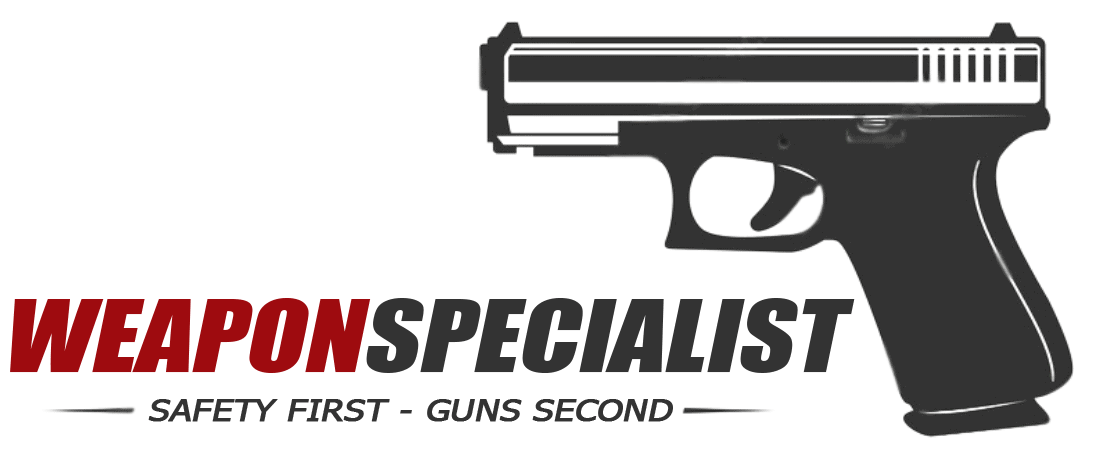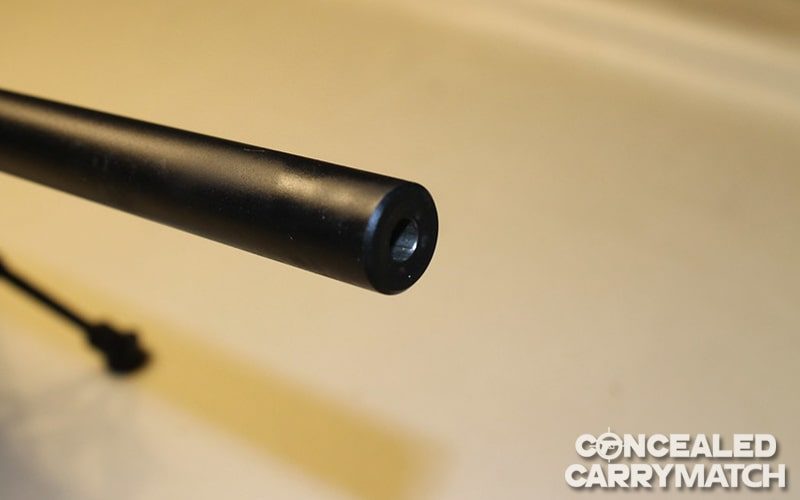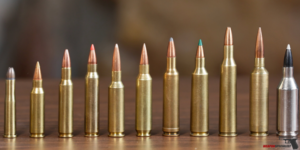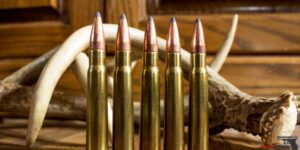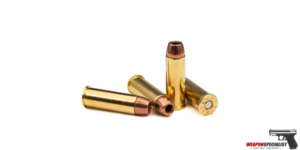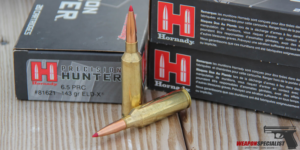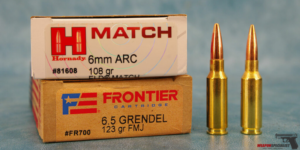A bull barrel, in the world of firearms, is an intriguing and specialized component that serves a distinct purpose in enhancing the performance and accuracy of a firearm.
As an enthusiast or newcomer to the world of guns, understanding what a bull barrel is and how it differs from other barrel types is essential.
In this exploration, I will delve into the intricacies of a bull barrel, shedding light on its unique characteristics and why it holds a significant place in the firearms community.
What Is A Bull Barrel?
Bull barrels also known as bull pipes, are special barrels for rifles. Unlike the regular barrels that taper outward, the bull barrels are cylindrical with more stiffness. It can reduce the vibration from air pressure when shooting.
The bull barrels are typically thicker than the traditional barrel types in size.
It is a prevalent gadget for semi-auto guns, pistols, and rifles. Besides their thick diameters, the bull barrels also come with a much heavier weight.
The materials for making bull barrels are very stiff and high-quality, commonly aluminum or alloy steel.
It has grown in popularity in recent times and is used by many long-range, bullseye, and defensive shooters.
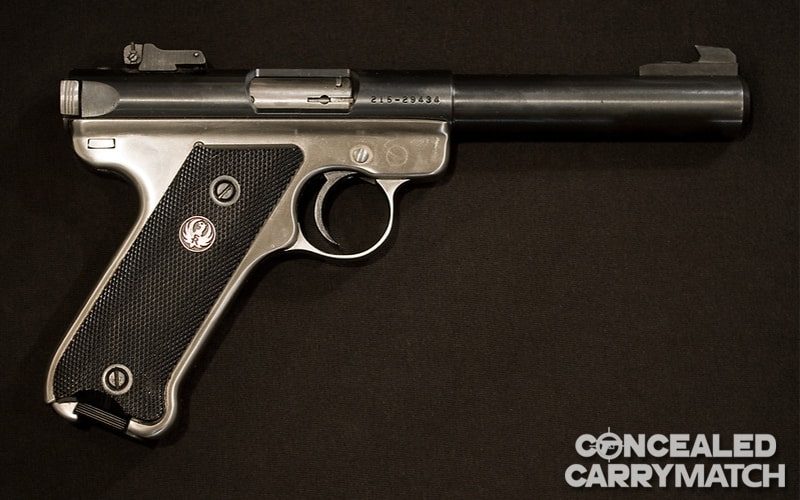
Why Use A Bull Barrel?
Due to their higher stiffness, the bull barrel can reduce the vibration generated by air pressure when shooting.
As a result, you will shoot with more comfort and less vibration when using a bull barrel than a regular barrel.
In addition, less vibration equals higher accuracy, which is undoubtedly a significant advantage in shooting competitions.
Moreover, bull barrels can minimize the risk of twisting forces that will reduce your shooting accuracy.
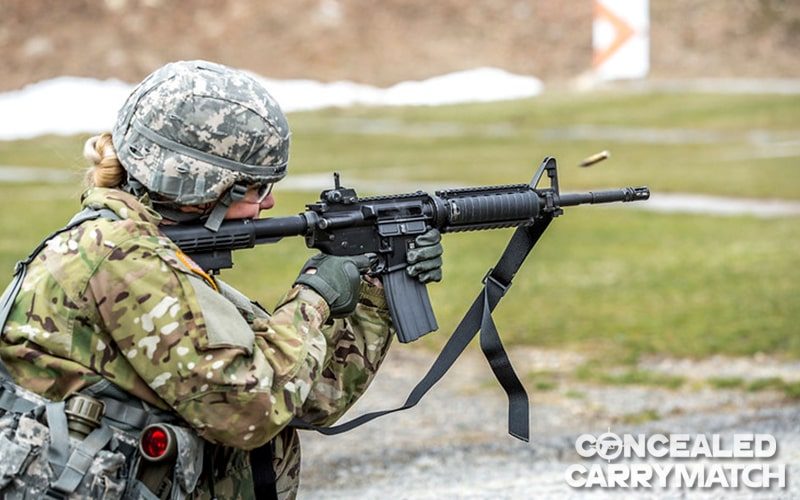
On standard barrels, the hot temperature generated when firing can expand the barrel’s material and ruin its structure in the long run.
Aluminum or alloy steel can withstand the heat better and remain rigid when exposed to high temperatures.
For this reason, the bull barrels offer higher durability and consistency. Last but not least, their heavy weight also partly reduces recoil and provides users with more overall comfort.
If you need more information on the bull barrels and other types, consider watching the video below.
Who Uses Bull Barrels?
Due to the higher precision and more consistency, the bull barrels are an ideal option for long-range shooting. However, these barrels feature excellent versatility and are suitable for various purposes.
In long-range shooting competitions where precision is the priority, the bull barrels can increase gunners’ performance significantly.
Therefore it’s not surprising that most bull barrels’ users are bullseye shooters and professional gunners.
But you can still use the bull barrel for regular purposes like defensive shooting.
It is also used by the military and police forces to enhance performance in the missions. The hunters are also not an exception.
Types Of Bull Barrels
There are three basic types of bull barrel: rifle, revolvers, and 1911 bull barrel. Here are their basic functions and core differences you should consider.
Rifle Bull Barrel
Rilfebull barrel is the most prevalent product, which is equipped with many long-range shooting rifles.
It can reduce the recoil and vibration, allowing gunners to shoot more consistently and precisely.
However, the rifle bull barrels are very thick and heavy, which may cause significant uncomfortness in the usage process.
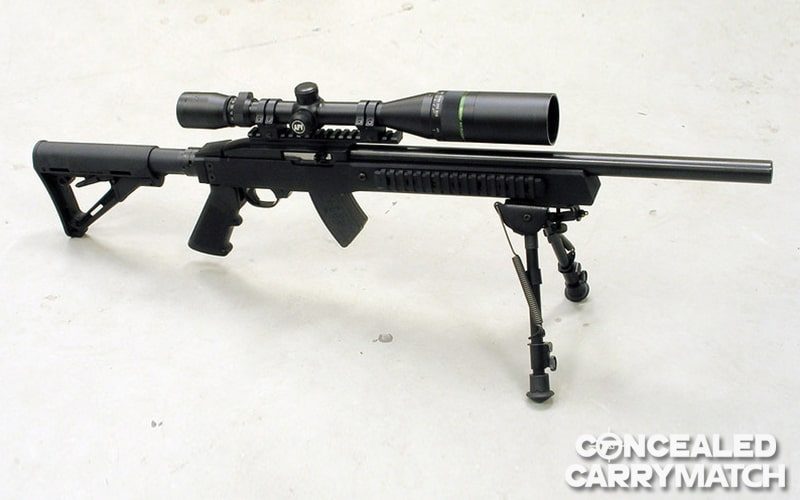
Revolver Bull Barrels
1911 or semi-auto bull barrels feature a conical shape that flares to the end of the gun. They increase consistency and accuracy, but at the cost of heavier weight.
Compare Bull Barrel vs Other Barrels
Bull Barrel Vs Standard
| Characteristic | Bull Barrel | Standard Barrel |
|---|---|---|
| Barrel Thickness | Thick and Heavy | Thinner and Lighter |
| Weight | Heavier | Lighter |
| Accuracy | Increased accuracy due to increased rigidity and reduced barrel harmonics | Good accuracy, but not as precise as bull barrels |
| Recoil Reduction | Better recoil reduction | Moderate recoil reduction |
| Heat Dissipation | Slower heat buildup | Faster heat buildup |
| Aesthetics | Often has a more tactical or target-oriented appearance | Traditional, slim profile |
| Portability | Less portable due to weight and bulkiness | More portable due to lighter weight and profile |
| Hunting | Less common for hunting | Common for hunting |
| Tactical/Target | Common for precision shooting, | Common for general |
| Shooting | benchrest shooting, and some competitive shooting sports | shooting, self-defense, and plinking |
| Customization | Often available in threaded and fluted options for customization | May be threaded for accessories, but less common for customization |
| Cost | Typically more expensive due to increased material and machining | Generally more affordable due to simpler construction and materials |
Bull Barrel Vs Regular Barrel
| Characteristic | Bull Barrel | Regular Barrel |
|---|---|---|
| Thickness | Thick and uniform diameter along the length | Tapered from chamber to muzzle, thinner |
| Weight | Heavier due to increased thickness | Lighter and more maneuverable |
| Heat Dispersion | Better heat dissipation due to thickness | May heat up more quickly during rapid firing |
| Accuracy | Enhanced accuracy, less susceptible to vibrations | Can be accurate, but may experience accuracy degradation due to barrel harmonics and heat |
| Barrel Life | Longer lifespan due to thickness and heat resistance | Shorter lifespan due to wear and tear over time |
| Typical Use | Precision rifles, target shooting, some competition handguns | General-purpose firearms, hunting rifles, self-defense handguns |
Heavy Barrel Vs Bull Barrel
| Feature | Heavy Barrel | Bull Barrel |
|---|---|---|
| Barrel Thickness | Generally thicker and heavier for added weight and rigidity. | Thicker and heavy for improved accuracy and stability |
| Weight | Heavier due to the increased thickness. | Typically heavier compared to standard barrels but lighter than heavy barrels. |
| Heat Dissipation | Excellent heat dissipation due to the increased surface area. | Good heat dissipation due to increased surface area. |
| Recoil Control | Helps reduce recoil and muzzle rise, improving accuracy. | Provides better recoil control and muzzle stability for improved accuracy. |
| Accuracy | Enhances accuracy by reducing barrel harmonics and vibration. | Improves accuracy by reducing barrel harmonics and vibration. |
| Aesthetics | Often has a utilitarian appearance with a straight profile. | Typically has a thicker and more substantial appearance. |
| Portability | Less portable due to increased weight. | Less portable due to increased weight. |
| Common Use Cases | Precision shooting, long-range shooting, competition shooting. | Target shooting, precision shooting, varmint hunting. |
| Maintenance | Requires regular maintenance to prevent corrosion and ensure accuracy. | Requires regular maintenance to prevent corrosion and ensure accuracy. |
| Cost | Often more expensive due to the manufacturing process and materials. | Generally more expensive than standard barrels but may be more affordable than heavy barrels. |
Setbacks Of A Bull Barrel
Though a bull barrel gives you more rigidity, it comes at the cost of less resilience. If you prefer a more powerful shooting experience and more recoil, then the bull barrel can hardly satisfy it.
Another disadvantage is the heavy weight. For professional shooters, the weight should not be a problem, but it is a different story for hunters and regular users.
A bull barrel increases the overall weight of your firearm by two pounds. Though it is not that much, carrying that weight for an extended period is inconvenient.
Lastly, bull barrels are more expensive than regular barrels on average.
FAQs about Bull Barrel
So that is the basic information you need to know about the bull barrels. If you still want to discover more about this gadget, then the answers below can satisfy your curiosity.
1. Are there different types of bull barrels?
Yes, there are different types of bull barrels available. The most common type is the heavy barrel, characterized by its thick profile and increased weight. There are also fluted bull barrels, which feature grooves cut into the outer surface for reduced weight without sacrificing strength or accuracy. Lastly, there are match-grade bull barrels, which are known for their superior accuracy and durability.
These barrels are typically made from high-quality materials such as stainless steel or chrome-molybdenum alloy and undergo rigorous testing to ensure the highest levels of precision. Overall, a bull barrel is an excellent choice for shooters looking for increased accuracy and reliability in their firearm.
Regardless of the type, bull barrels can provide increased accuracy and reliability and are ideal for target shooting or long-range precision shooting. With their thick profile and added weight, they also offer better balance and stability when aiming.
However, the additional weight may make them less suitable for hunting or fast-paced scenarios. Ultimately, it is important to consider the intended use of your firearm and whether or not a bull barrel is right for you.
2. What Is A Fluted Barrel?
The fluted barrel is another popular barrel for the firearm, which has an outer part milled in a pattern. The patterns come in various consistent shapes like a spiral, straight, diamond, or bear claw.
3. What’s The Benefit Of A Fluted Barrel?
While fluted barrels barely affect shooting accuracy, they give you more comfort in the usage process.
A fluted barrel is generally light, but it still fulfills the basic functions of a barrel: protect your firearm from overheating and reduce vibration.
4. What Is The Advantage Of A Heavy Barrel?
Regular barrels can expand when exposed to the high heat generated when firing, thus affecting your accuracy over time. A heavy or bull barrel can tackle this problem.
Its shape stays unchanged and is immune to high heat, giving gunners more consistency in the long run. It also reduces vibration and recoil.
5. Are there any advantages to using a bull barrel?
Yes, there are several advantages to using a bull barrel. As mentioned previously, the barrel’s increased thickness and surface area provide excellent stability when shooting, reducing recoil and increasing accuracy.
Additionally, because of the shape of the barrel, it is less susceptible to heat distortion due to rapid firing, making it ideal for competitions or long-range precision shooting. The thicker barrel also increases accuracy and durability, making it great for target shooting.
Finally, the shape of a bull barrel helps to distribute weight down the centerline of the rifle, providing better balance and stability when aiming. All these factors make bull barrels an ideal choice for shooters looking for a reliable and accurate barrel.
6. Are there any drawbacks to using a bull barrel?
The main drawback of using a bull barrel is its added weight to the rifle. Bull barrels are heavier than other barrels and can add significant weight to your firearm, making it less suitable for hunting or fast-paced shooting scenarios. Additionally, the increased barrel thickness can reduce gas efficiency in semi-automatic rifles, requiring frequent cleaning and maintenance.
Bull barrels are an excellent choice for those looking for an accurate and reliable barrel for their firearm. The advantages in terms of accuracy and durability far outweigh any potential drawbacks. However, it is important to consider your rifle’s intended use and whether a bull barrel is right for you.
7. Is a bull barrel better for accuracy and precision shooting?
Yes, a bull barrel is often better for accuracy and precision shooting. The thicker profile of the barrel provides greater stability when firing, meaning that it stays on target more consistently than thinner barrels. Its increased surface area and greater mass make it less prone to distortion from rapid fire or intense heat, making it ideal for long-range precision shooting or competitions.
Finally, the weight distribution of the barrel helps provide excellent balance and stability when aiming, further contributing to its accuracy. All these factors make bull barrels an ideal choice for shooters looking for consistent rifle accuracy and precision.
8. What kinds of firearms typically use a bull barrel?
Bull barrels, such as bolt-action and semi-automatic varieties, are most commonly seen on target rifles. They are also found on some hunting rifles, particularly those used for long-range shooting.
Bull barrels can also be a good choice for AR-15s because of their increased accuracy and durability. Finally, bull barrels are becoming increasingly popular with competition shooters due to their increased accuracy and reliability.
Final Thoughts
A bull barrel is a useful gadget that every rifle and pistol user should opt for to get a satisfying shooting experience. I hope you can tell what a bull barrel is by now. If you have any further questions, let me know in the comment section. Did you have a great time reading this post? Thank you for your time!
Last Updated on November 1, 2023 by
